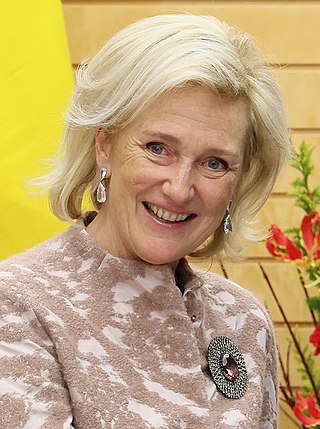The Cercle de Lorraine (French) or Club van Lotharingen (Dutch) was a Belgian business club, located in Brussels. The club was founded in 1998 to bring together distinguished and representative personalities from the Belgian financial community, both French-speaking (Walloons) as well as Dutch-speaking (Flemish), who were united within an honorary committee.
On 11 May 2020, the press reported that the Cercle de Lorraine was for sale due to financial difficulties. In August 2020, it was further reported that the Cercle would disappear and be replaced by a new concept currently being developed by its new owners. [1]

Brussels, officially the Brussels-Capital Region, is a region of Belgium comprising 19 municipalities, including the City of Brussels, which is the capital of Belgium. The Brussels-Capital Region is located in the central portion of the country and is a part of both the French Community of Belgium and the Flemish Community, but is separate from the Flemish Region and the Walloon Region, located less than 4 kilometres (2.5 mi) to the south. Historically Dutch-speaking, Brussels saw a language shift to French from the late 19th century. Nowadays, the Brussels-Capital Region is officially bilingual in French and Dutch, although French is the majority language and lingua franca. Brussels is also increasingly becoming multilingual. English is spoken widely and many migrants and expatriates speak other languages as well.

Belgium is a country in Europe and member of major international organizations like the European Union and NATO which are both headquartered in Brussels, Belgium.

Princess Astrid of Belgium, Archduchess of Austria-Este, is the second child and first daughter of King Albert II and Queen Paola, and the younger sister to the current Belgian monarch, King Philippe. She is married to Prince Lorenz of Belgium, head of the Austria-Este branch of the House of Habsburg-Lorraine, and is fifth in line of succession to the Belgian throne.
Walloon is a Romance language that is spoken in much of Wallonia and, to a very small extent, in Brussels, Belgium; some villages near Givet, northern France; and a clutch of communities in northeastern Wisconsin, United States.

UCLouvain is Belgium's largest French-speaking university and one of the oldest in Europe. It is located in Louvain-la-Neuve, which was expressly built to house the university, and Brussels, Charleroi, Mons, Tournai and Namur. Since September 2018, the university uses the branding UCLouvain, replacing the acronym UCL, following a merger with Saint-Louis University, Brussels.

The Kingdom of Belgium has three official languages: Dutch, French, and German.
Maurice Robert Josse Marie Ghislain, Count Lippens is a Belgian businessman and banker. He is the grandson of Maurice Lippens (1875) and brother of Leopold Lippens, mayor of Knokke-Heist.

Foug is a commune in the Meurthe-et-Moselle department in the grand Est region of France.

The Brussels International Exposition of 1935 was a world's fair held between 27 April and 6 November 1935 on the Heysel/Heizel Plateau in Brussels, Belgium.

Royal Association Athlétique Louviéroise La Louvière is a Belgian professional football club based in La Louvière, in the province of Hainaut. The club founded in 2009 out of a merger, competes in Challenger Pro League from 2024–25, the second tier of Belgian football after promotion from Belgian National Division 1 in 2023–24.

Mass Hysteria is a French heavy metal band formed in 1993. They have released eleven studio albums and four live albums in their 30-year career. Their breakthrough came in 1999 with their second album Contraddiction.

Massimo Bruno is a Belgian footballer who plays as a right winger for Kortrijk.

José Riga is a Belgian football manager and former player. He had a fifteen-year playing career as a midfielder, beginning in 1974 when he joined C.S. Visé. He remained with the club for eleven years, before joining fellow Belgian club JS Haccourt in 1985. He played for JS Haccourt for four years. Two years after retiring from playing, he became JS Haccourt's manager.

Kylian Hazard is a Belgian professional footballer who plays as an attacking midfielder for Belgian First Amateur Division club Royale Union Tubize-Braine. He has two older brothers, Eden and Thorgan, and one younger, Ethan, all of whom are footballers.

Kévin Hoggas is a French professional footballer who plays as a midfielder for Championnat National club Sochaux.

Senna Malik Miangué is a Belgian professional footballer who plays as a defender for Cercle Brugge. Having previously played in the academies of Beerschot and Royal Antwerp in his native Belgium, Miangué moved to Italy in 2013 to join Serie A side Internazionale.
Events in the year 1870 in Belgium.
Gary Magnée is a Belgian professional footballer who plays as a right-back for Cercle Brugge.

Camille Pascal is a French writer and senior civil servant.